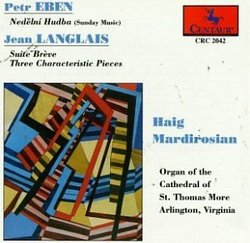| All Artists: Petr Eben, Jean Langlais, Haig Mardirosian Title: Petr Eben: Sunday Music; Jean Langlais: Suite Brève; Three Characteristic Pieces Members Wishing: 1 Total Copies: 0 Label: Centaur Release Date: 11/3/1993 Genre: Classical Styles: Forms & Genres, Suites Number of Discs: 1 SwapaCD Credits: 1 UPC: 789368050222 |
Search - Petr Eben, Jean Langlais, Haig Mardirosian :: Petr Eben: Sunday Music; Jean Langlais: Suite Brève; Three Characteristic Pieces
 | Petr Eben, Jean Langlais, Haig Mardirosian Petr Eben: Sunday Music; Jean Langlais: Suite Brève; Three Characteristic Pieces Genre: Classical
|
Larger Image |
CD Details |
CD ReviewsGreat music, slight recording flaws John K. Derby | Columbus, Ohio | 08/22/2003 (4 out of 5 stars) "First, I take issue with reviewers who are quick to dismiss Langlais. We're not talking about a schmuck composer here--I don't really like Brahms, for example, but I would not rebuke a recording for including Brahms when appropriate. The Langlais is not filler material, and in terms of instrumental proficiency, the three pieces are equal. Obviously, the Langlais is typical of the composer, less dramatic than the Eben. Still, I would not relegate Langlais to liturgical merit exclusively. That's absurd.The pieces are well played, with accuracy and enthusiasm. The instrument is up to the task, but there are some obnoxious recording flaws, such as slamming stops. Do you find that "honest"? If so, maybe you won't be bothered as am I.In all, this is excellent music, and if I were to lose this CD, I would replace it instantly. In defense of other viewers, the Eben is exceptional." A landmark symphony receives worthy treatment John K. Derby | 12/26/1999 (4 out of 5 stars) "Petr Eben's organ symphony 'Sunday Music' is an extraordinary and worthy asset to the modern organ repertoire. From the first bold plainsong proclamations of the opening fantasia its medieval atmosphere and profound intentions are clear, and the mysterious bell-like motive of the second movement sets the stage for the third. Here Eben replaces the traditional symphonic scherzo with a menacing and mercurial 'moto ostinato', propelled throughout by an insistent rhythmic motive as its vivid image of a mythical conflict is set out. The finale brings together the preceding movements in a second brilliant battle portrayal, and the unifying quality of this last movement does raise the question of why the third could gain such popularity on its own when the whole work is so much more effective complete.Such an outstanding work will obviously need an outstanding rendition here, particularly when this is one of very few recordings generally available. Haig Mardirosian easily matches the work technically, and his registrations are all carefully considered, but there is something lacking from the first part of his account. A more dramatic and extrovert delivery of the first movement is really required: the pauses should be more exaggerated and the improvisatory passages more free. Similarly the arch construction of the second fantasia could expand in a grander, more rhapsodic fashion. The 'moto ostinato' receives better treatment, perhaps in response to the greater interest in this movement. The registration is much more dramatic than that of most other players, leading to a more effective tension than is common. The rhythm is carefully judged throughout (except for a couple of frustrating slips in the central section) and the final page with its high-speed manual racket is managed brilliantly where so many performers trip up through trying to keep too rigid a rhythm. The finale is magnificent, and here the instrument's brilliant fanfare reeds are finally unleashed to devastating triumphant effect in the closing plainsong passage. Mardirosian here shows some animated virtuoso playing, and if only he could have brought it more into the first two movements this could have been an all-round first-rate performance. That said, this is still a very worthy recording and is valuable for the quality of its second half, even if the first, so widely disregarded, is disappointing.Langlais's 'Suite Breve' is unremarkable. Not hugely impressive, exciting or musically interesting, its place on this disc is surprising, particularly with the ugly clash of its noisy opening against the heroic end of the Eben. Mardirosian's performance is therefore bound to be unremarkable, but the 'Pieces Characteristiques' are three charming miniatures which he dashes off with satisfying facility, and they should not be overlooked as they form a relieving, pleasant postscript to the emotional heroism of the heroic symphony that has gone before." Virtuosity to burn John K. Derby | 05/06/2003 (5 out of 5 stars) "This organist attacks the difficult Eben score with utter abandon! What a thrilling ending to both the Moto ostinato, which has become popular as a single movement, and the whole suite. The last movement is rambling and big, but Mardirosian makes great sense from it and runs through the very difficult sounding passages with real authority.Eben's music is an idea whose day has come, especially when he has an organist like this on his side! Wonderful playing.The Langlais music is mostly take-it-or-leave it, maybe better in church than in concert. But, it also shows that Mardirosian has a lyric side."
|

 Track Listings (11) - Disc #1
Track Listings (11) - Disc #1